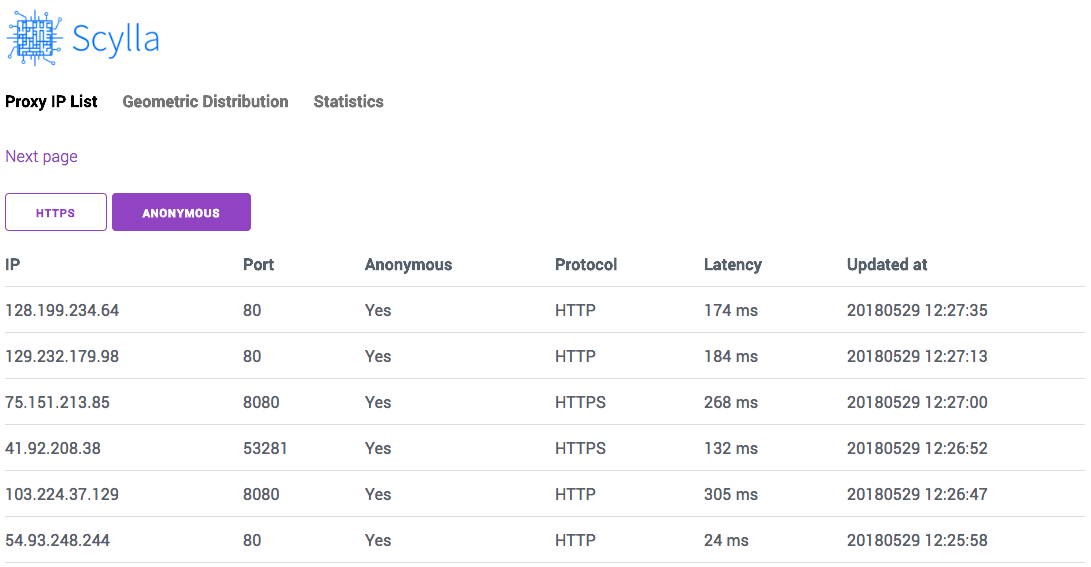Scylla: An Intelligent Proxy Pool for Humanities™¶
An intelligent proxy pool for humanities, only supports Python 3.6. Key features:
- Automatic proxy ip crawling and validation
- Easy-to-use JSON API
- Simple but beautiful web-based user interface (eg. geographical distribution of proxies)
- Get started with only 1 command minimally
- Simple HTTP Forward proxy server
- Scrapy and requests integration with only 1 line of code minimally
- Headless browser crawling
对于偏好中文的用户,请阅读 中文文档。For those who prefer to use Chinese, please read the Chinese Documentation
Get started¶
Installation¶
Install with Docker (highly recommended)¶
docker run -d -p 8899:8899 -p 8081:8081 -v /var/www/scylla:/var/www/scylla --name scylla wildcat/scylla:latest
Install directly via pip¶
pip install scylla
scylla --help
scylla # Run the cralwer and web server for JSON API
Install from source¶
git clone https://github.com/imWildCat/scylla.git
cd scylla
pip install -r requirements.txt
npm install # or yarn install
make build-assets
python -m scylla
Usage¶
This is an example of running a service locally (localhost), using port 8899.
Note: You might have to wait for 1 to 2 minutes in order to get some proxy ips populated in the database for the first time you use Scylla.
JSON API¶
Proxy IP List¶
http://localhost:8899/api/v1/proxies
Optional URL parameters:
| Parameters | Default value | Description |
|---|---|---|
| page | 1 |
The page number |
| limit | 20 |
The number of proxies shown on each page |
| anonymous | any |
Show anonymous proxies or not. Possible values:true, only anonymous proxies; false, only transparent proxies |
| https | any |
Show HTTPS proxies or not. Possible values:true, only HTTPS proxies; false, only HTTP proxies |
| countries | None | Filter proxies for specific countries. Format example: US, or multi-countries: US,GB |
Sample result:
{
"proxies": [{
"id": 599,
"ip": "91.229.222.163",
"port": 53281,
"is_valid": true,
"created_at": 1527590947,
"updated_at": 1527593751,
"latency": 23.0,
"stability": 0.1,
"is_anonymous": true,
"is_https": true,
"attempts": 1,
"https_attempts": 0,
"location": "54.0451,-0.8053",
"organization": "AS57099 Boundless Networks Limited",
"region": "England",
"country": "GB",
"city": "Malton"
}, {
"id": 75,
"ip": "75.151.213.85",
"port": 8080,
"is_valid": true,
"created_at": 1527590676,
"updated_at": 1527593702,
"latency": 268.0,
"stability": 0.3,
"is_anonymous": true,
"is_https": true,
"attempts": 1,
"https_attempts": 0,
"location": "32.3706,-90.1755",
"organization": "AS7922 Comcast Cable Communications, LLC",
"region": "Mississippi",
"country": "US",
"city": "Jackson"
},
...
],
"count": 1025,
"per_page": 20,
"page": 1,
"total_page": 52
}
System Statistics¶
http://localhost:8899/api/v1/stats
Sample result:
{
"median": 181.2566407083,
"valid_count": 1780,
"total_count": 9528,
"mean": 174.3290085201
}
HTTP Forward Proxy Server¶
By default, Scylla will start a HTTP Forward Proxy Server on port 8081.
This server will select one proxy updated recently from the database and it will be used for forward proxy.
Whenever an HTTP request comes, the proxy server will select a proxy randomly.
Note: HTTPS requests are not supported at present.
The example for curl using this proxy server is shown below:
curl http://api.ipify.org -x http://127.0.0.1:8081
You could also use this feature with requests:
requests.get('http://api.ipify.org', proxies={'http': 'http://127.0.0.1:8081'})
Other Examples¶
Example with Requests¶
Requests is a very nice and mature HTTP library for Python. To use Scylla with this library is very easy.
With the JSON API¶
import requests
import random
json_resp = requests.get('http://localhost:8899/api/v1/proxies').json()
proxy = random.choice(json_resp['proxies'])
requests.get('http://api.ipify.org', proxies={'http': 'http://{}:{}'.format(proxy['ip'], proxy['port'])})
HTTPS proxy is also supported as well:
import requests
import random
json_resp = requests.get('http://localhost:8899/api/v1/proxies?https=true').json()
proxy = random.choice(json_resp['proxies'])
requests.get('https://api.ipify.org', proxies={'https': 'https://{}:{}'.format(proxy['ip'], proxy['port'])})
With the forward proxy server¶
requests.get('http://api.ipify.org', proxies={'http': 'http://127.0.0.1:8081'})
System Design¶
Validation Policy¶
The validation proxy for proxy ips is described in validation_policy.py :
1 2 3 4 5 6 7 8 9 10 11 12 13 14 15 16 17 18 19 20 21 22 23 24 25 26 27 28 29 30 31 32 33 34 35 36 37 38 39 40 41 42 43 44 45 46 47 48 49 50 | from datetime import datetime, timedelta
from scylla.database import ProxyIP
class ValidationPolicy(object):
"""
ValidationPolicy will make decision about validating a proxy IP from the following aspects:
1. Whether or not to validate the proxy
2. Use http or https to validate the proxy
After 3 attempts, the validator should try no more attempts in 24 hours after its creation.
"""
proxy_ip: ProxyIP = None
def __init__(self, proxy_ip: ProxyIP):
"""
Constructor of ValidationPolicy
:param proxy_ip: the ProxyIP instance to be validated
"""
self.proxy_ip = proxy_ip
def should_validate(self) -> bool:
if self.proxy_ip.attempts == 0:
return True
elif self.proxy_ip.attempts < 3 \
and datetime.now() - self.proxy_ip.created_at < timedelta(hours=24) \
and not self.proxy_ip.is_valid:
# If the proxy is created within 24 hours, the maximum attempt count is 3
return True
elif timedelta(hours=48) > datetime.now() - self.proxy_ip.created_at > timedelta(hours=24) \
and self.proxy_ip.attempts < 6:
# The proxy will be validated up to 6 times with in 48 hours after 24 hours
return True
elif datetime.now() - self.proxy_ip.created_at < timedelta(days=7) \
and self.proxy_ip.attempts < 21 \
and self.proxy_ip.is_valid:
# After 48 hours the proxy is created, the proxy will be validated up to
# 21 times (3 times a day on average) if it is valid within 7 days.
return True
# By default, return False
return False
def should_try_https(self) -> bool:
if self.proxy_ip.is_valid and self.proxy_ip.attempts < 3 \
and self.proxy_ip.https_attempts == 0:
# Try https proxy for the 2nd and 3rd time if the proxy is valid
return True
return False
|
API Documentation¶
Please read Module Index.
Development and Contribution¶
git clone https://github.com/imWildCat/scylla.git
cd scylla
pip install -r requirements.txt
npm install # or `yarn install`
make build-assets
Testing¶
If you wish to run tests locally, the commands are shown below:
pip install -r tests/requirements-test.txt
pytest tests/
You are welcomed to add more test cases to this project, increasing the robustness of this project.
Naming of This Project¶
Scylla is derived from the name of a group of memory chips in the American TV series, Prison Break. This project was named after this American TV series to pay tribute to it.





\ Sort by:\ best rated\ newest\ oldest\
\\
Add a comment\ (markup):
\``code``, \ code blocks:::and an indented block after blank line